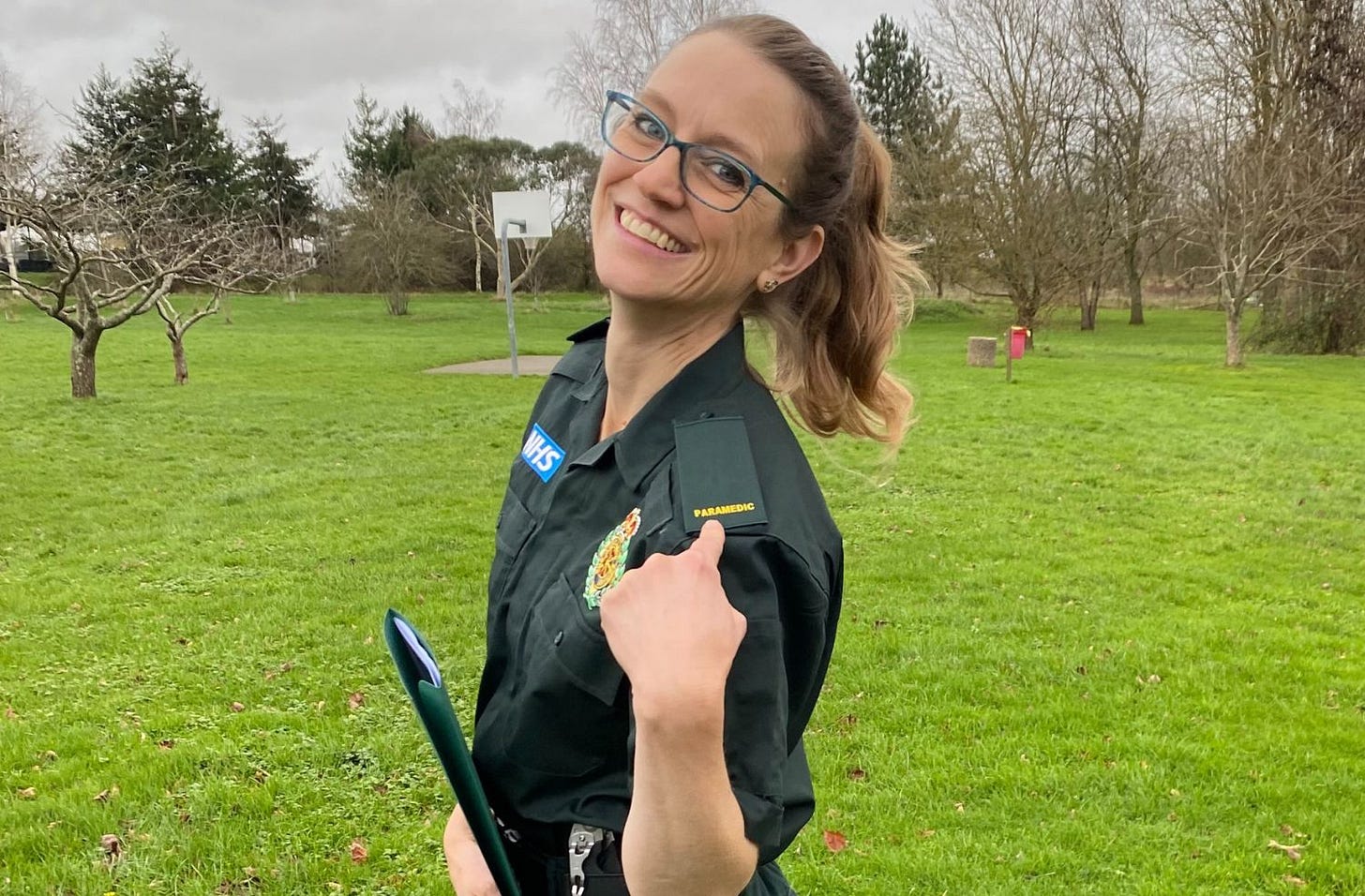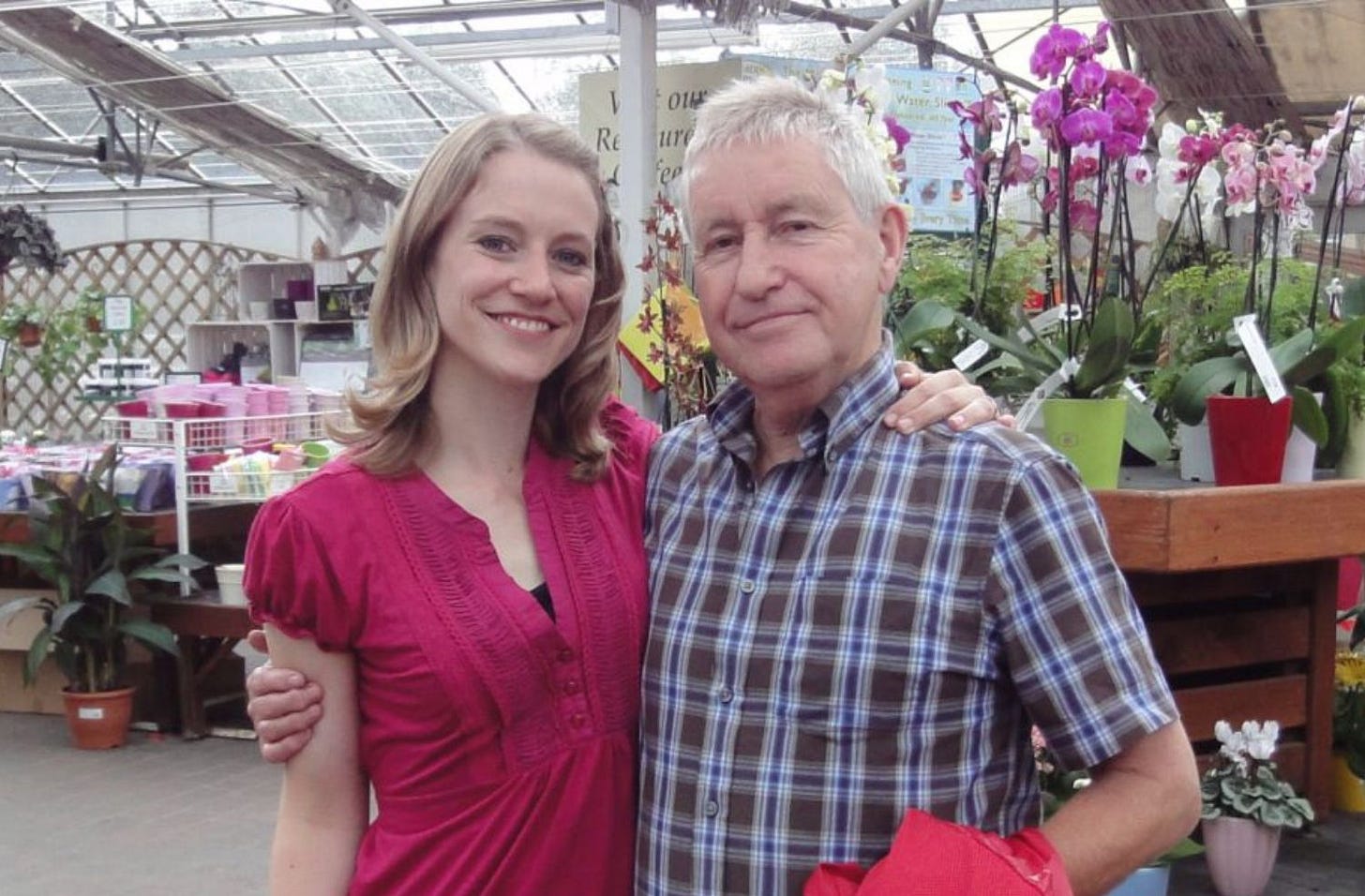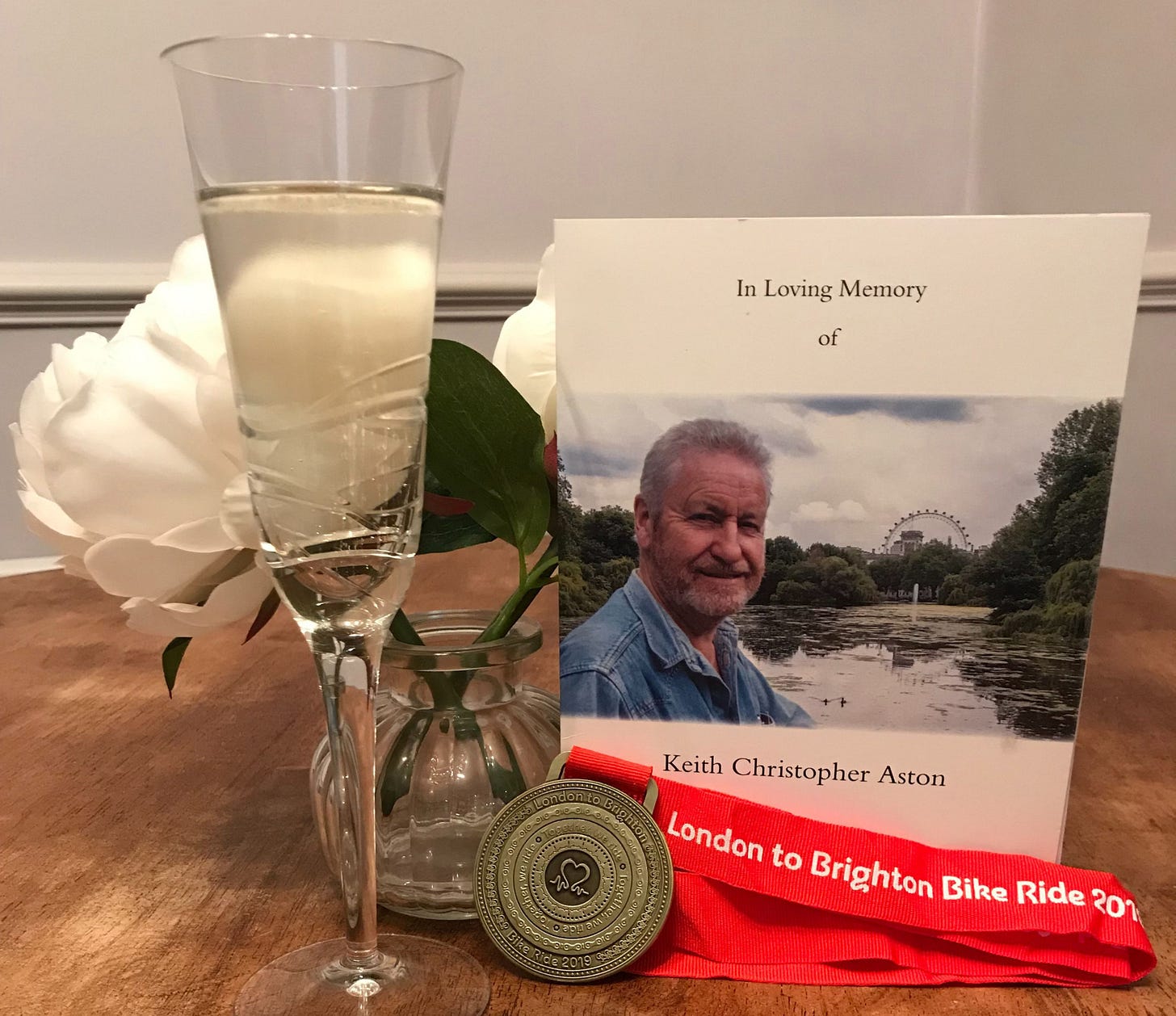Starting a chain of survival: how a paramedic found her calling
Joanna Michaelides: paramedic - Surrey, England
(Rather hear the full conversation? Here you go!)
“Me being me, I was running late,” says Joanna Michaelides. Back in 2009, she’d just left her parents’ house and was driving home to London when “I looked out of my window and could see a man lying on his back on the pavement, with his bicycle lying next to him, a group of people standing around him looking horrified, and someone on the phone.”
Before she’d had her first child, Joanna had been temping for a law firm where she’d happened to do a first aid course. But as she says, “I never thought I’d have to use it.”
“I had that split second decision of, ‘do I drive on?’ - because there were people there. But the thing that made me stop was no one seemed to be doing anything.” She got out of the car, “And then I had this moment of going, ‘Crap, what is it I’m supposed to do again?’”
DRs ABC
Luckily, every first aid class teaches you a mnemonic, which Joanna followed to the letter:
D: Danger. The man was on the pavement, so there was no danger to him or anyone else.
R: Response. Joanna started “tapping him on the shoulders, saying, ‘Open your eyes’” and getting no response.
S: Shout for help. Someone was already calling for an ambulance.
A: Airways. “When someone’s unresponsive, all the muscles in the body relax, including the tongue which can flop over and block their airway,” To lift the tongue off the back of the airway, “you put your palm on the forehead, two fingers under the chin and tip the head back.”
B: Breathing. Joanna could see the man wasn’t breathing normally, he was taking noisy gasps on the inhale, followed by a massive pause. “And that’s not normal breathing: that’s something called agonal breathing which is what the body does when the heart’s not working properly.”
C: CPR. “Crikey”, thought Joanna, “I’m going to have to do this thing that I did on a dummy however many months ago in a room, on a person.”
And for the next 15-20 minutes, Joanna gave CPR and rescue breaths to a complete stranger.
“I heard the person who was on the phone saying, ‘Yeah, there’s someone here – she looks like she knows what she’s doing.’ So, I thought, that’s good. At least I’m looking effective.” And then the professionals arrived and took over, using a defibrillator to shock the man’s heart as they bundled him into the ambulance. Finally, with a brief ‘thank you’ to Joanna, they drove off.
“I obviously didn’t know what happened to the person because off he went to hospital and that was it.”
Against the odds
Six months later, her mum called her with urgent news, “That man you gave CPR to – he’s in the local paper!” He wasn’t only alive; he’d recently completed a 200-mile bike ride in aid of the British Heart Foundation. The article told how he’d had a cardiac arrest and a “passing nurse” had given him CPR, starting a chain of survival. And now he was doing whatever he could to pay it forward.
Joanna’s mum wanted to correct the record, “I’d really like to write to the paper and let them know it wasn’t a nurse – it was just a normal person who’d done a first aid course. And maybe if other people did that, it would be a good thing.”
As soon as the man – Keith Aston – read her reply, he got in touch with Joanna. He’d been trying everything he could to track her down, “because without CPR there wouldn’t have been anything to work with when the ambulance service arrived”.
Joanna remembers, “He wrote me this lovely letter which I still have, I still treasure it. It’s a very emotional letter full of how he feels and how grateful he was to have that second chance.” And then they met up in a local garden centre (the photo below was taken that day). “That’s the moment my life pivoted from where it was going to where it is now,” says Jo.
Reflecting on the moment their paths first crossed, “Both of us were profoundly moved by the number of people that hadn’t known what to do. And both of us had purpose from that moment to try and do something about it in our community.”
CPR is a simple skill that almost anyone can learn, at any age. “So, we set up a CPR training group, which has been running for 13 years now.” The scheme – Heartstart Farnham Lions – continues to teach these essential skills for free, twice a month, every month. And so far they’ve trained over 2000 individuals across schools, community groups, colleges, scout groups and carnivals. “Some of those people have come back to us to say they’ve used their skills to save someone else and that’s so rewarding, because you then see it continuing to pay forward.”
Suddenly, “I felt like I had a purpose and a passion, to empower all those people – like me, like those other bystanders who’d all been there not knowing what to do – to give them skills and the confidence to be able to act if somebody needed their help.”
Everything starts to make sense
“We started off with Heartstart. I then trained as a first aid trainer for St John Ambulance … I loved training people but was also quite interested in treating patients … So, I became a volunteer Community First Responder (CFR) for the ambulance service.”
CFRs are ordinary people who are trained to respond to emergencies ahead of ambulances. “And I absolutely loved it.” The more patients she saw, the more Joanna wanted to learn about their pathophysiology, the drugs paramedics would administer, and what they were doing. She was seeing each response as a learning opportunity – employing a growth mindset: a belief you can develop your talents and abilities through dedication and practice. “This was when I really started to feel like this was my ‘thing’. This is where this has all been headed.”
The natural next step was to train as a paramedic, surely? But no, she’d studied drama at university decades ago, and was now a busy mum of two with enough on her plate. “I felt like I was too old and I’d missed the boat.”
Maturing into purpose
And then Covid made her reassess everything.
Initially, a friend quit a job she didn’t like, stating, “I’m going to enjoy my life!” Then, very tragically, another friend died. “And it made me think … I’ve been skirting around the edges for years - why don’t I just do it?”
Her children were now at school, so she could find the time to study. But “obviously my qualifications were a thousand years old by then, and not relevant because they were arts based.” So, to get the ball rolling, she enrolled on an access course at a local college before getting a place to study Paramedic Science at the University of Surrey, where she turned into “a massive nerd”.
Joanna found she’d reignited her love of learning. “If you’d told me when I was 17 that I’d be going back [to study science], I would have laughed in your face!” But this time round, she wasn’t interested in hedonistic pursuits or the pub. And three years later, she graduated with a first.
The signs were there all along
“This isn’t a job I could have done when I was 18,” reflects Joanna. Back in the early 2000s, she’d finished her undergraduate degree and then done a postgrad in acting, but while she “loved being on stage” she didn’t like the transient nature of the profession, lack of money (very few jobs were paid), or constant need to sell herself. She’d drifted through temp jobs, feeling increasingly lost.
But it turns out all of it was preparing her for now. Her drama training was proving especially valuable, as “80% of what we do in the ambulance service is about communication.” Her own mental health struggles when she was younger have given her empathy and understanding for vulnerable patients. And years spent advocating for one of her children who has special educational needs have equipped her with the ability to speak up “for somebody who can’t advocate for themselves”.
Even becoming a mum has played its part. “I love being a mum,” she says. “That period when the kids were small felt very fulfilling, for a different reason. And that sort of feeds into my purpose too.” It’s given her patience, empathy and the ability to stay calm amongst chaos - all essential skills for a paramedic.
“There have been lots of little arrows pointing me in this direction.”
Take time to smell the roses
Keith was there at the start of Joanna’s journey, and she was there for the end of his. While training for another British Heart Foundation bike ride, “He had a massive haemorrhagic stroke which was unsurvivable.” She went to visit him in the hospital. “I was holding his hand when he died – and that was a massive privilege.”
A week before he passed away, Joanna was dropping some CPR manikins off at his house and he asked if she had five minutes to stop for a chat. As usual, she was running late and thought she ought to get home for the kids. But something made her stay. “We sat in his garden and we literally smelt the roses,” she remembers. “He spoke about what a lovely life he’d had. He told me all sorts of things – things he’d done when he was younger, how he felt about life, and how he was so grateful to have had all the experiences he’d had. And that was the last conversation I had with him.”
Keith passed away in 2019 so never knew Joanna had trained as a paramedic, but “he would have been very, very chuffed.”
What keeps her going?
The 12-hour shifts can be physically and emotionally draining – particularly when children are involved or patients especially distressed. But there’s a strong sense of purpose, “It’s a job where you know that you can make a big difference to people.”
“It’s difficult to describe the feeling,” she reflects, “It’s about having a sense of knowing what I’m doing. It’s about confidence, autonomy and being fulfilled by what I do.” In psychological speak, this is called self-determination theory: when we feel a sense of competence, autonomy and connection, we flourish. Joanna’s found all three.
Recently, she bumped into a patient she’d treated for a heart attack several months earlier. He was now back to full health and, “He remembered me, he remembered the crew, and he was really grateful.” It’s moments like these that help sustain her through the tougher days.
One of her mentors gave some advice that she’s never forgotten, “Every day, go home and think of at least one thing you’ve done well.” It helps build resilience. And it’s working, “I feel like I’m a better person, friend, partner, mum – a better person in general – because not only do I have purpose, something that I enjoy and feel fulfilled by, I’m also happier.” This aligns with research into prosocial behaviour: when we help others, our own wellbeing increases. Of course, it’s not always as cut-and-dried as that, especially for people working in the emergency services, but for Joanna it’s proving true.
There are many ways to make a difference
While Joanna loves being a paramedic and remains passionate about teaching CPR, she hints that an evolution of purpose isn’t off the cards. Her university dissertation explored the emotional impact on bystanders who give CPR before the ambulance service arrives. “I did a lot of research into what’s done for them, how they might feel, and how that could be improved. So that’s a little project that’s still twinkling in my mind for when I’m a bit more embedded in what I’m doing now.”
To Joanna, purpose means “being on the path you feel you should be on, and making a difference to people in a positive way.” And her advice to anyone still searching for theirs is to turn inwards, “Listen to yourself, to what motivates you, makes you happy and makes you tick, and try to follow that in some way – whatever that might be.”
Please don’t be a bystander
Do you want to learn CPR? Start by googling “CPR classes near me”. If you’re in the UK, you could also check out St John Ambulance, the British Red Cross, or local community schemes - like Heartstart Farnham Lions.
“I would really, really encourage anybody to learn CPR. It’s really easy, it’s an essential life skill, and you could be the difference to somebody between life and death.”
Sixteen years ago, Joanna stopped to help a stranger. This split-second decision gave Keith a second chance at life and helped Joanna find her purpose – and has given thousands of others the power to make a positive difference too.
Uncut and unfiltered: the full conversation
If you’d like to find out more about Joanna’s path to becoming a paramedic, make yourself a cup of tea and settle in. You’ll hear more detail about the obstacles Joanna overcame as a youngster and after university (the first time round), what it was like to start finding purpose as a mum, how returning to study in her 40s gave her a whole new love of learning, and the day-to-day emotional highs and lows of being a paramedic.
She also offers really sound advice on why it’s ok to take your time to find your purpose and how to get there (which made me feel a lot better about still not having found mine).
Please note: there is a small amount of uncensored language in this recording.



